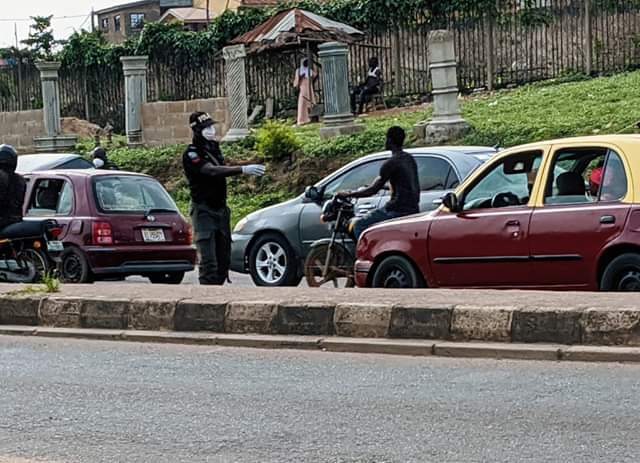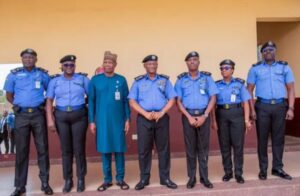
Before the lockdown in Ogun, Lagos, and the Federal Capital Territory was announced four weeks ago, I drove to Ibadan for a special assignment and for some personal engagement. Strangely, I did not encounter a single police officer between Lagos and Ibadan — perhaps everyone was preparing for the eventual lockdown. This is unusual for the busiest road in Nigeria.
But upon entering Ibadan, I encountered a first in a lifetime kind of sight: Two police officers wielding AK-47 mount a roadblock to collect some money from commercial vehicle drivers. They stop a Nissan Micra — arguably the most popular vehicle in Ibadan — and say a few words to the driver while stretching their hands into the car to get something. Not long into the conversations, the drivers part with N50 note. The process is repeated for every passing taxi.
With what I had just seen, I parked not too far from the officers and came down to amuse myself some more. A police officer with a nose mask on, wields a gun, wears off-white latex gloves to collect the usual. The novel coronavirus had changed the face of bribe collection in Nigeria, I thought to myself.
Driving to the COVID-19 drive-through centre at Adamasingba a few days later, I came across the same sight, but this time, something had changed. One of the two police officers I saw some days earlier, was now tired of gloves and masks. So he was without the two protective items, while the other police officer had his mask on, but no gloves.
On the same day, I got a call from Lagos, with complaints that police officers and men of other security agencies have not been protecting themselves in the face of a virus that has killed over 200,00 people globally and 40 people in Nigeria.
“Many of them do not wear masks, no gloves, there do not observe social distancing, and they rest on people’s cars not considering how dangerous that could be,” the caller, a friend who sincerely cares about the officers said.
She said police officers make the highest number of contacts with citizens while enforcing lockdown, asking that the officers protect themselves for the sake of their families and society. “They should observe social distancing and understand that everybody could be a carrier of the virus”
‘CORONAVIRUS IN THE BARRACKS’
Police officer with mask and gloves on collects bribes from drivers in Ibadan
“Mayowa, can you imagine coronavirus breaking out in the barracks? You know how densely populated the barracks can be, and you know how people live in barracks,” she added, still expressing genuine concern for the men of the Nigeria Police Force (NPF).
When it comes to disease control, the UN agencies consider refugee camps, prisons, schools, military and police barracks as “special settings”, which must be heavily protected from any sort of outbreak. The experience is that outbreaks in this setting are of exponential proportions. They go a long way in affecting the general recovery in the country.
Love the police or loathe them, they are frontline workers in the battle against a pandemic like the novel coronavirus. They have played active roles in enforcing lockdowns across the nation. I spoke to a police officer about the situation and the officer said they have been busier now than they ever were in pre-COVID times — working nearly round the clock to keep Nigerians indoor because “corona is outside”.
But as coronavirus is outside, so are the police officers. They need protection.
Oga, you are not immune to coronavirus
Since President Buhari announced the relaxation of lockdown in Ogun, Lagos, and the Federal Capital Territory (FCT), Nigerians have been making jokes about COVID-19. They often end some of the jokes with “may the best immune system win”.
COVID-19 has largely been a game of immune systems and how healthy a person was before contracting the disease. This has given the illusion that younger persons or those who consider themselves healthy will quickly recover from the deadly pandemic.
This is necessarily not the case, we have recorded deaths of thousands of people in their twenties across the world. Nigeria recently recorded the death of a 29-year-old who was recently delivered of a child. These tragedies should remind us that we are all human, and we do not know how strong our immune system is until it has been tested.
May our immune systems not be tested.
The Police Commands in every state should educate their officers on social distancing, the need to wear simple protective items, and avoid contact with drivers and cars on the roads while enforcing any lockdown — or post lockdown. It would be great to see police with not just guns but hand sanitisers and face masks too.
The police, FRSC, NSCDC, and officials of other security agencies also deserve protection at this time.
The invisible enemy is not a respecter of uniforms.












